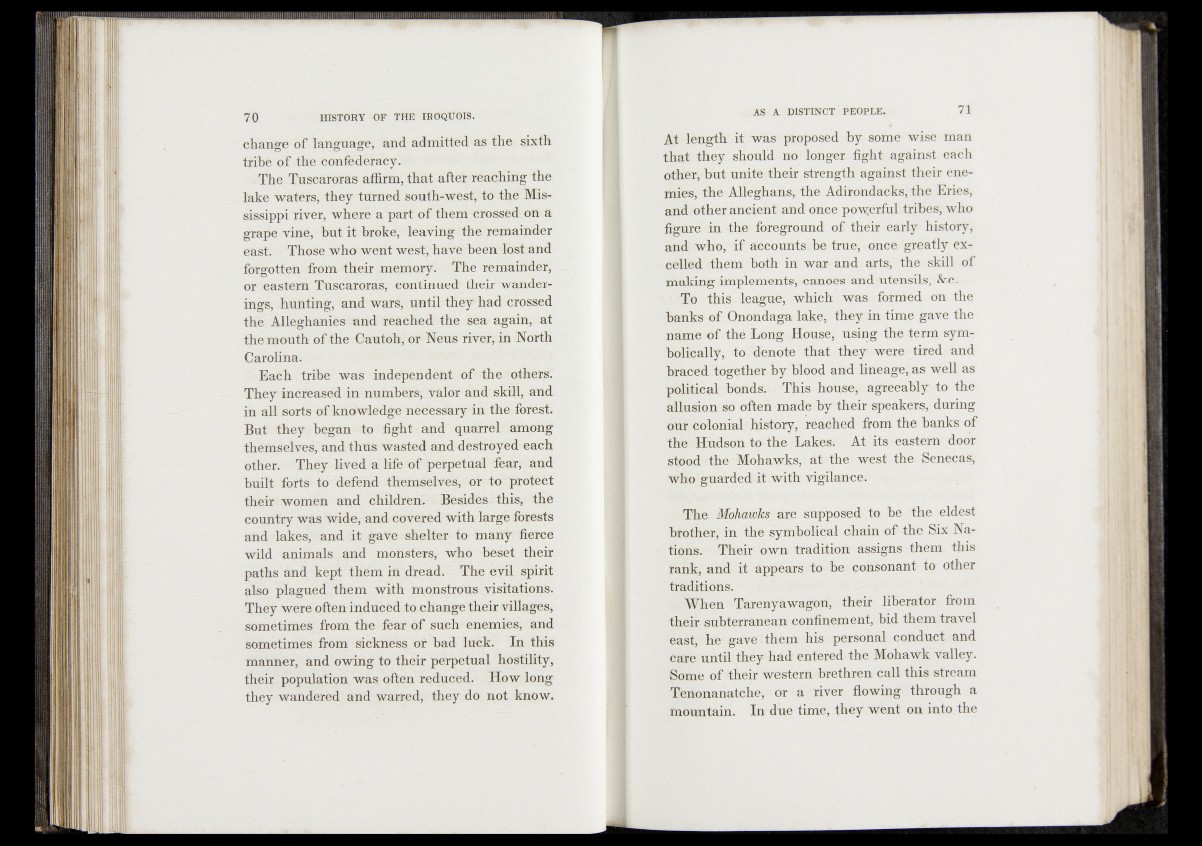
change of language, and admitted as th% sixth
tribè of the confederacy.
The Tuscaxoras affirm, that after reaching the
lake waters, they turned south-west, to the Mis*
sissippi river, "where a part of them crossed on a
grape vine, hut it broke, leaving the remainder
east. Those who went west, have been; lost and
forgotten from their memory; The remainder)
or eastern Tuscaroras, continued their wanderings,
hunting, and wars, until they had crossed
the Alleghanies and reached the sea again, at
the mouth of the Cautofr, or Neus river, in North
Carolina.
Each tribe was independent of the others.
They increased in numbers, valor hnd skill, and
in all sorts of kno wledge necessary in the forest.
But they began to fight and quarrel among
themselves, and thus wasted and destroyed each
other. They lived a life of perpetual fear, and
built forts to defend themselves, or to- protect
their women and children. Besides this, the
country was wide, and covered with large forests
and lakes, and it gave shelter to mariy fierce
wild animals and monsters, who beset their
paths and kept them in dread. The evil spirit
also plagued them with monstrous visitations.
They were often induced to change their villages,
sometimes from the fear of such enemies, and
sometimes from sickness or bad luck. In this
manner, and owing to their perpetual hostility,
their population was often reduced. How long
they wandered and warred, they do not know.
AS A DISTINCT PEOPLE. 71
At length it was proposed by some wise man
that they should no longer fight against each
other, but unite their strength against their enemies,
the Alleghans, the Adirondacks, the Eries,
and other ancient and once powerful tribes, who
figure in «the foreground of their early history,
and who, if accounts; be true, oncé greatly excelled
them both in war and arts, the skill of
making implements, canoes and utensils, &c.
To this league, which was formed on the
banks of Onondaga lake, theydn time gave the
name of the Long House, using the term symbolically,
to denote that they'were tired and
braced together by blood and lineage, as well as
political bonds* This house, agreeably to the
allusion so often made by their speakers, during
our colonial history, reached from the banks of
the Hudson to the.Lakes; At its eastern door
stood the Mohawks/ at the west the- Senecas,
who guarded-it with vigilance.
The Mohawks are supposed to be the eldest
brother, in the symbolical chain of the Six Nations.
Their own tradition assigns them this
tank, and it appears to be consonant to other
traditions.
When Tarenyawagon, their liberator, from
their subterranean confinement -, bid them travel
east, he gave-them his personal conduct and
care until they had entered the Mohawk valley.
Some of ;their western brethren Call this stream
Tenonanatche,' or a river flowing through a
mountain. In due time, they went on into thé